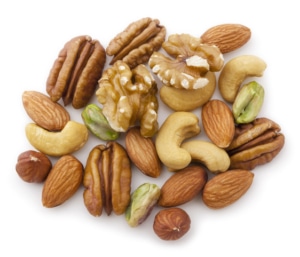As you stack up pecans vs. walnuts, your health and taste buds are always the winners, regardless of which you choose. Glenda’s Farmhouse provides wholesome foods prepared in a peanut-free facility for your family’s kitchen.

Our love of the land continues, and we strive to operate with sustainable farming practices through water conservation, recycling, and protection of pollinators and biodiversity.
Comparison of Pecans and Walnuts
Shelled walnuts and pecans look pretty similar. While they’re similar in a range of ways, they are also distinctly different in how they taste and the nutritional profile of each. They’re the same size, shape, texture, and color, and we even use them in pretty similar ways when cooking or topping yogurts, salads, and other meals.
Visual Differences
When in their shells, walnuts and pecans are easily identified. Walnut shells are round and rough, while pecan shells are oblong and football-shaped with a smooth surface.
When out of the shell, pecans are usually smaller and a richer brown in color.
Flavor Differences
Pecans tend to enhance the sweetness of a dish, and walnuts will elevate a rich sweetness with a complementary savory flavor. On the sweet-to-bitter spectrum, pecans are on the sweeter end, with walnuts on the other, bitter end. They both provide an extra crunch to salads, frozen desserts, and other soft foods and can often be used interchangeably in recipes. Be thoughtful when swapping out pecans and walnuts, and consider the potential flavor change that will follow.
Nutrition Differences
Pecans
Serving Size = 1 oz. = about 20 nuts = about ¼ cup
- 190 calories
- 3 g protein
- 20 g total fat
- 2 g saturated fat
- 11 g monounsaturated fat
- 6 g polyunsaturated fat
- 0 g trans fat
- 0 g cholesterol
- 4 g carbohydrate
- 3 g fiber
- 1 g net carbs
- 20 mg calcium
- 0.72 mg iron
- 34 mg magnesium
- 79 mg phosphorus
- 116 mg potassium
- 1.28 mg zinc
- 0.06 mg Vitamin B6 (5% of DV)
- 0.04 mg Vitamin E (2% of DV)
- 1.0 µg Vitamin K (1% DV)
Walnuts
Serving Size = 1 oz. serving = about 15 nuts = about ¼ cup
- 200 calories
- 5 g protein
- 20 g total fat
- 2 g saturated fat
- 2.5 g monounsaturated fat
- 14 g polyunsaturated fat
- 0 g trans fat
- 0 g cholesterol
- 4 g carbohydrates
- 2 g fiber
- 2 g net carbs
- 28 mg calcium
- 0.82 mg iron
- 45 mg magnesium
- 98 mg phosphorus
- 125 mg potassium
- 0.88 mg zinc
- 0.152 mg Vitamin B6 (12% of DV)
- 0.02 mg Vitamin E (1% of DV)
- 0.8 µg Vitamin K (1% of DV)
As you can see, walnuts and pecans are both winners in terms of nutritional value. While pecans have fewer calories and more fiber, walnuts offer a higher degree of protein. Whichever you choose, you’ll enjoy heart-healthy nutrition with anti-inflammatory, antioxidant, and healthy cholesterol properties.
As you shop at Glenda’s Farmhouse and weigh pecans vs. walnuts, choose both! Keep them in stock, freeze them for long-term storage, and incorporate them into your daily menu for various health benefits ranging from cardiovascular health to weight management and even healthier hair and skin. For easy ordering and fast delivery, order with us online or call (530) 839-2236.



